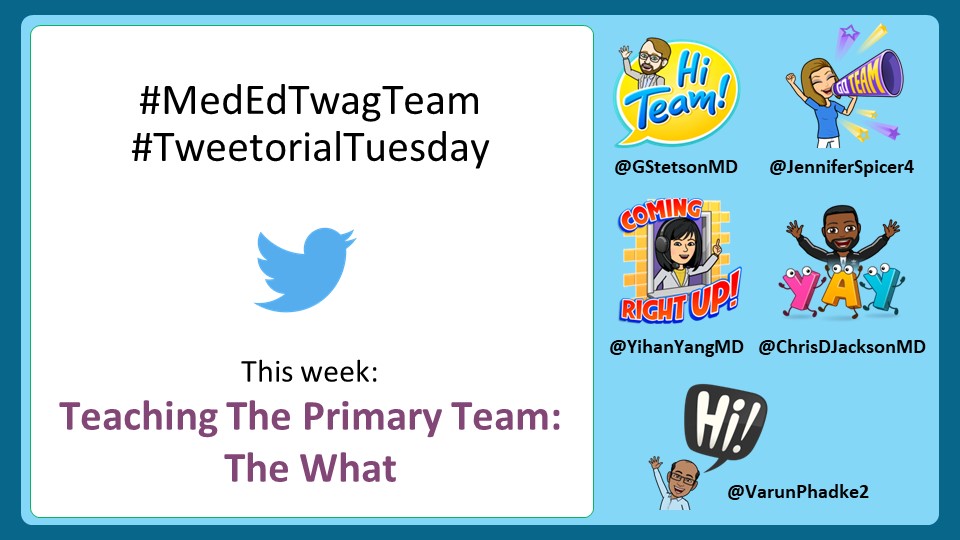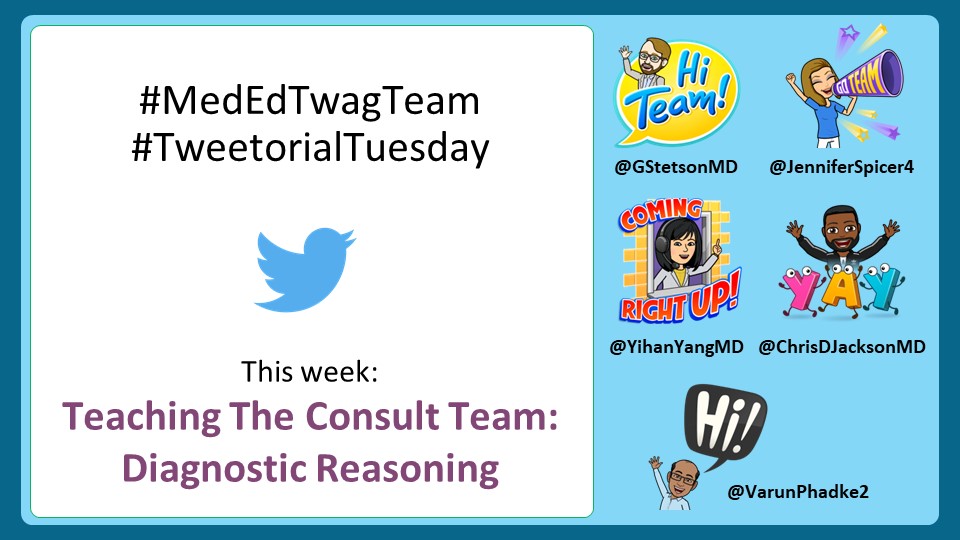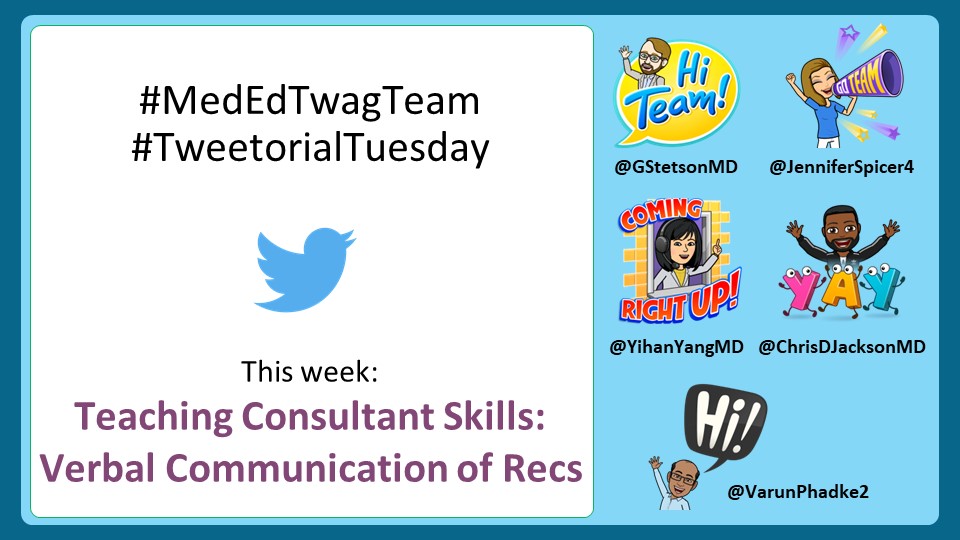1/ Do you reminisce about the days when every learner on your consult team began their rotation w/ you on the SAME day?
When you had to set expectations just once?
And you NEVER, EVER had to repeat yourself?
(Yeah, right 😉)
This week: Setting Expectations on Consult Teams
When you had to set expectations just once?
And you NEVER, EVER had to repeat yourself?
(Yeah, right 😉)
This week: Setting Expectations on Consult Teams

2/ Whenever I want a refresher on setting expectations, I refer to this high-yield previous thread by @GStetsonMD
There you will find lots of pro tips about:
❓ Why we set expectations
❓ What kinds of expectations to set
❓ How to set expectations
https://twitter.com/GStetsonMD/status/1303329970526105600
There you will find lots of pro tips about:
❓ Why we set expectations
❓ What kinds of expectations to set
❓ How to set expectations
3/ I’m not going to rehash those concepts here.
So…what ELSE do subspecialty educators need to know about setting expectations?
Let’s think about some unique considerations (and challenges!) for teachers on consult teams...
So…what ELSE do subspecialty educators need to know about setting expectations?
Let’s think about some unique considerations (and challenges!) for teachers on consult teams...
4/ First, let’s acknowledge the reality that learners are constantly parachuting in & rotating off our consult teams.
I’ve illustrated how this plays out - attending & learner start/end dates rarely line up!
This means setting expectations "just once" is an unrealistic goal.
I’ve illustrated how this plays out - attending & learner start/end dates rarely line up!
This means setting expectations "just once" is an unrealistic goal.

5/ Second, other than our own fellows, most learners on our consult teams are visitors doing an elective. This means they are far less familiar w/ our:
📚 Subject matter
🔀 Workflow
💬 Cultural “norms”
(and, any assumptions they have about our specialty may be incorrect!)
📚 Subject matter
🔀 Workflow
💬 Cultural “norms”
(and, any assumptions they have about our specialty may be incorrect!)
6/ This impacts the KINDS of expectations we have to set w/ learners.
For example:
1⃣ What & how they should expect to LEARN
2⃣ What they will be expected to DO (as members of the consult TEAM)
3⃣ How they will be expected to ACT (as representatives of the consult SERVICE)
For example:
1⃣ What & how they should expect to LEARN
2⃣ What they will be expected to DO (as members of the consult TEAM)
3⃣ How they will be expected to ACT (as representatives of the consult SERVICE)
7/ For 1⃣ I will again reference @GStetsonMD who shared this framework of “expectation categories”
This helps organize expectations that pertain to what & how team-members will LEARN.
The same framework can be applied to learners on consult teams too.
https://twitter.com/GStetsonMD/status/1303329992009367553
This helps organize expectations that pertain to what & how team-members will LEARN.
The same framework can be applied to learners on consult teams too.
8/ For 2⃣ - what learners are expected to DO - I separate expectations into the “big picture” & “nitty gritty”.
I try to discuss the “big picture” on EVERY learner’s 1st day & f/u w/ an email containing the “nitty gritty”.
(see tinyurl.com/TIDIntro for an email example)
I try to discuss the “big picture” on EVERY learner’s 1st day & f/u w/ an email containing the “nitty gritty”.
(see tinyurl.com/TIDIntro for an email example)

9/ You might think it’s repetitive to go over these expectations EVERY time a learner joins the team, when that happens constantly.
It’s not.
In fact, going over them each time:
☑️ Resets everyone back to a common standard
☑️ Allows existing team-members to chime in w/ pearls
It’s not.
In fact, going over them each time:
☑️ Resets everyone back to a common standard
☑️ Allows existing team-members to chime in w/ pearls
10/ Additionally, reminding learners of the concrete “to dos” of their experience on a consult team builds toward several “meta” learning objectives.
In other words, intentional reminders of what we as consultants are doing can make learners better "end users" of our services!
In other words, intentional reminders of what we as consultants are doing can make learners better "end users" of our services!

11/ Finally let’s turn to 3⃣ - how learners will be expected to ACT as representatives of the consult service.
For better or worse, every consult service has a “reputation." Many learners come to their subspecialty rotation with that “rep” in mind based on prior experiences...
For better or worse, every consult service has a “reputation." Many learners come to their subspecialty rotation with that “rep” in mind based on prior experiences...
12/ We need to be mindful of this when setting expectations, b/c while on the consult TEAM, learners are ambassadors for the consult SERVICE.
This of course involves role-modeling how we talk about & interact w/ other teams.
But it can also include situation-specific guidance.
This of course involves role-modeling how we talk about & interact w/ other teams.
But it can also include situation-specific guidance.
13/ Some examples:
❓ How to discuss our role in a case w/ a patient who is unaware we have been consulted?
❓ How to communicate recommendations that may be ‘unpalatable’?
❓ How to interact w/ another consult service with whom we disagree?
What others have YOU encountered?
❓ How to discuss our role in a case w/ a patient who is unaware we have been consulted?
❓ How to communicate recommendations that may be ‘unpalatable’?
❓ How to interact w/ another consult service with whom we disagree?
What others have YOU encountered?
14/ How do we set expectations for these scenarios?
I’ve gotten better at this by reflecting on situations that I’ve seen handled poorly to create “anticipatory guidance”, which I turn into “what if” ❓
🤔 What if the team says...
🤔 What if the patient asks...
🤔 What if...
I’ve gotten better at this by reflecting on situations that I’ve seen handled poorly to create “anticipatory guidance”, which I turn into “what if” ❓
🤔 What if the team says...
🤔 What if the patient asks...
🤔 What if...

15/ You cannot prepare your learners for every scenario. In future threads we will share strategies for intentionally developing these skills.
Until then, remember that part of expectation setting is prepping your learners to be effective representatives of your specialty!
Until then, remember that part of expectation setting is prepping your learners to be effective representatives of your specialty!
16/ To recap:
I’ve discussed 3 unique considerations for setting expectations on a consult team & shared strategies to navigate these issues.
Many of these sometimes feel redundant or “obvious”, but, when done effectively, I find the experience ⬆️enjoyable (& ⬆️predictable!)
I’ve discussed 3 unique considerations for setting expectations on a consult team & shared strategies to navigate these issues.
Many of these sometimes feel redundant or “obvious”, but, when done effectively, I find the experience ⬆️enjoyable (& ⬆️predictable!)

17/ Next week I will kick off a series of threads about “Teaching Consultant Skills,” starting w/ “Receiving Consults.”
Remember to check out #SubspecialtyTeaching @MedEdTwagTeam to keep up with all our threads in one place!
Happy Thanksgiving & see you next week!
Remember to check out #SubspecialtyTeaching @MedEdTwagTeam to keep up with all our threads in one place!
Happy Thanksgiving & see you next week!

• • •
Missing some Tweet in this thread? You can try to
force a refresh











